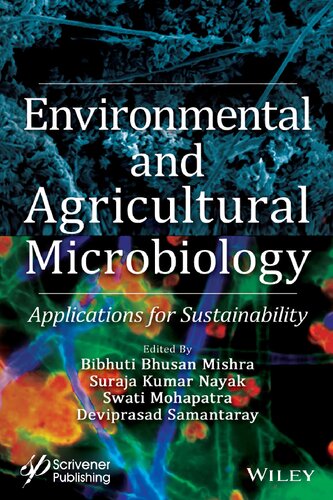

Most ebook files are in PDF format, so you can easily read them using various software such as Foxit Reader or directly on the Google Chrome browser.
Some ebook files are released by publishers in other formats such as .awz, .mobi, .epub, .fb2, etc. You may need to install specific software to read these formats on mobile/PC, such as Calibre.
Please read the tutorial at this link: https://ebookbell.com/faq
We offer FREE conversion to the popular formats you request; however, this may take some time. Therefore, right after payment, please email us, and we will try to provide the service as quickly as possible.
For some exceptional file formats or broken links (if any), please refrain from opening any disputes. Instead, email us first, and we will try to assist within a maximum of 6 hours.
EbookBell Team

0.0
0 reviewsThe book, Environmental and Agricultural Microbiology: Applications for Sustainability is divided in to two parts which embodies chapters on sustenance and life cycles of these microorganisms in various environmental conditions, their dispersal, interactions with other inhabited communities, metabolite production and reclamation. Though books pertaining to soil & agricultural microbiology/environmental biotechnology are available, there is a dearth of comprehensive literature on behavior of microorganisms in environmental and agricultural realm. Part 1 includes bioremediation of agrochemicals by microalgae, detoxification of chromium and other heavy metals by microbial biofilm, microbial biopolymer technology including polyhydroxyalkanoates (PHAs) and polyhydroxybutyrates (PHB), their production, degradability behaviors and applications. Biosurfactants production and their commercial importance are also systematically represented in this part. Part 2 having 9 chapters and facilitates imperative ideas on approaches for sustainable agriculture through functional soil microbes, next generation crop improvement strategies via rhizosphere microbiome, production and implementations of liquid biofertilizers, mitigation of methane from livestocks, chitinases from microbes, extremozymes, an enzyme from extremophilic microorganism and their relevance in current biotechnology, lithobiontic communities and their environmental importance have been comprehensively elaborated. In the era of sustainable energy production biofuel and other bioenergy products play a key role and their production from microbial sources are frontiers for researchers. The last chapter unveils the importance of microbes and their consortia for management of solid waste in amalgamation with biotechnology.